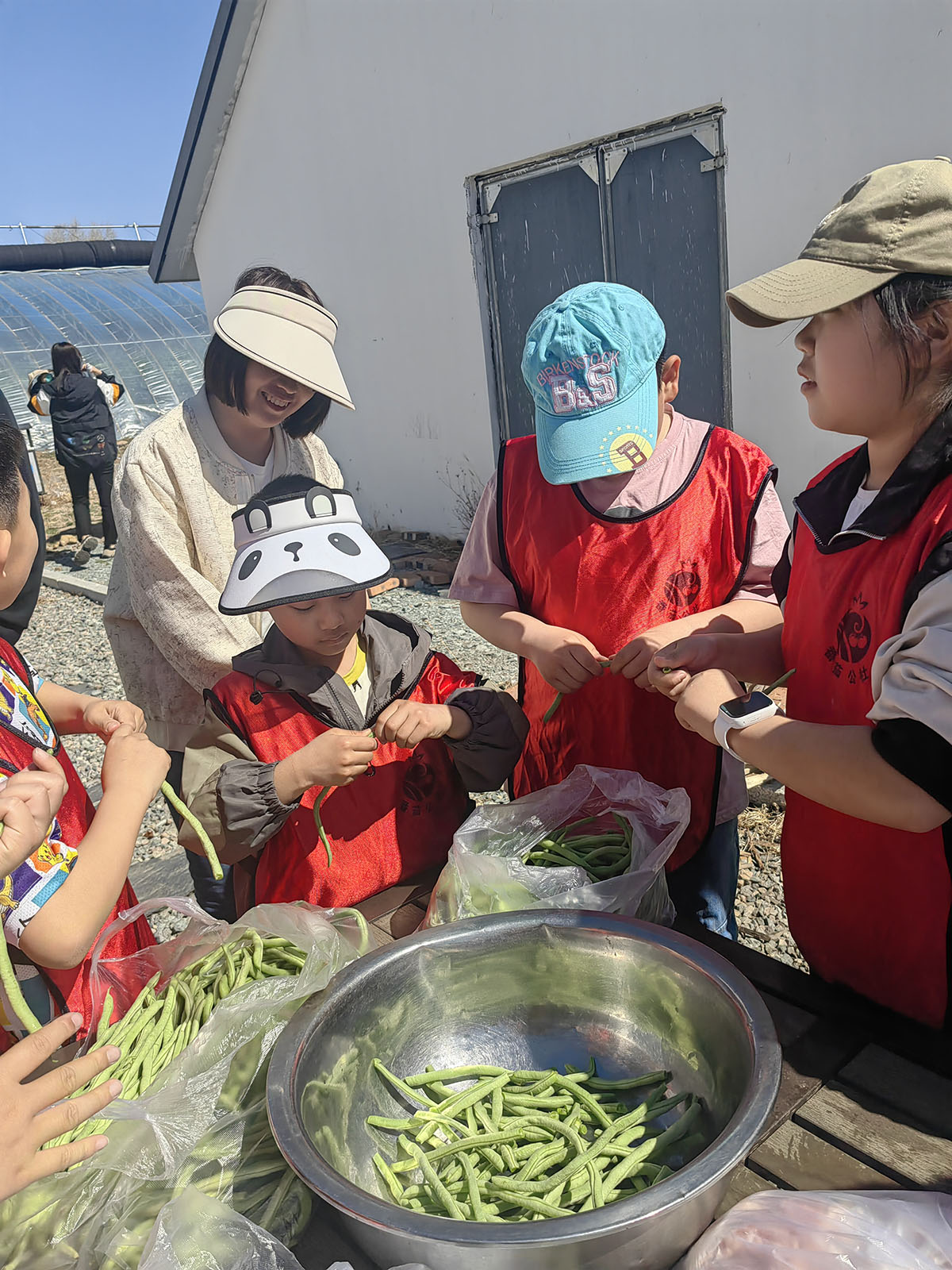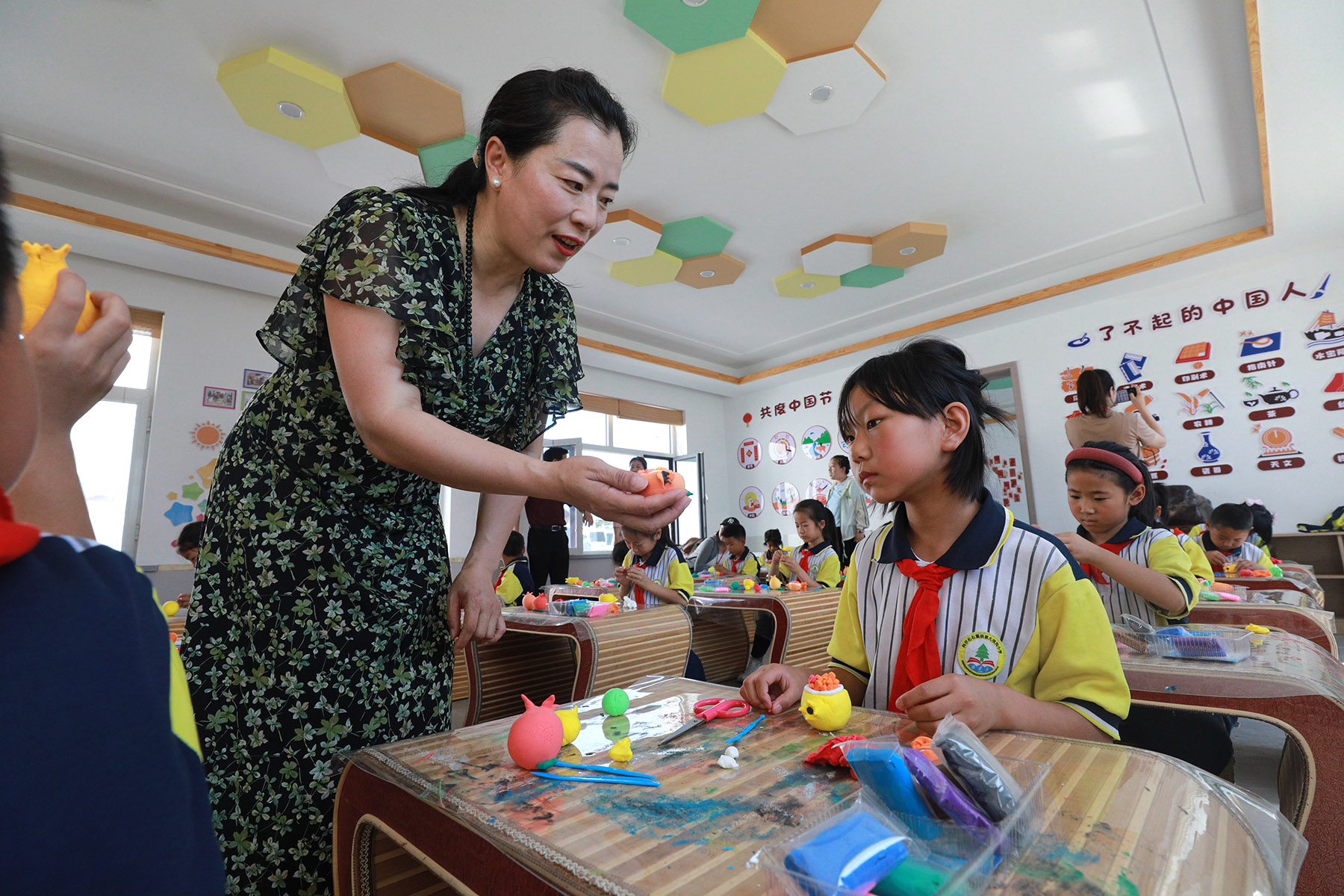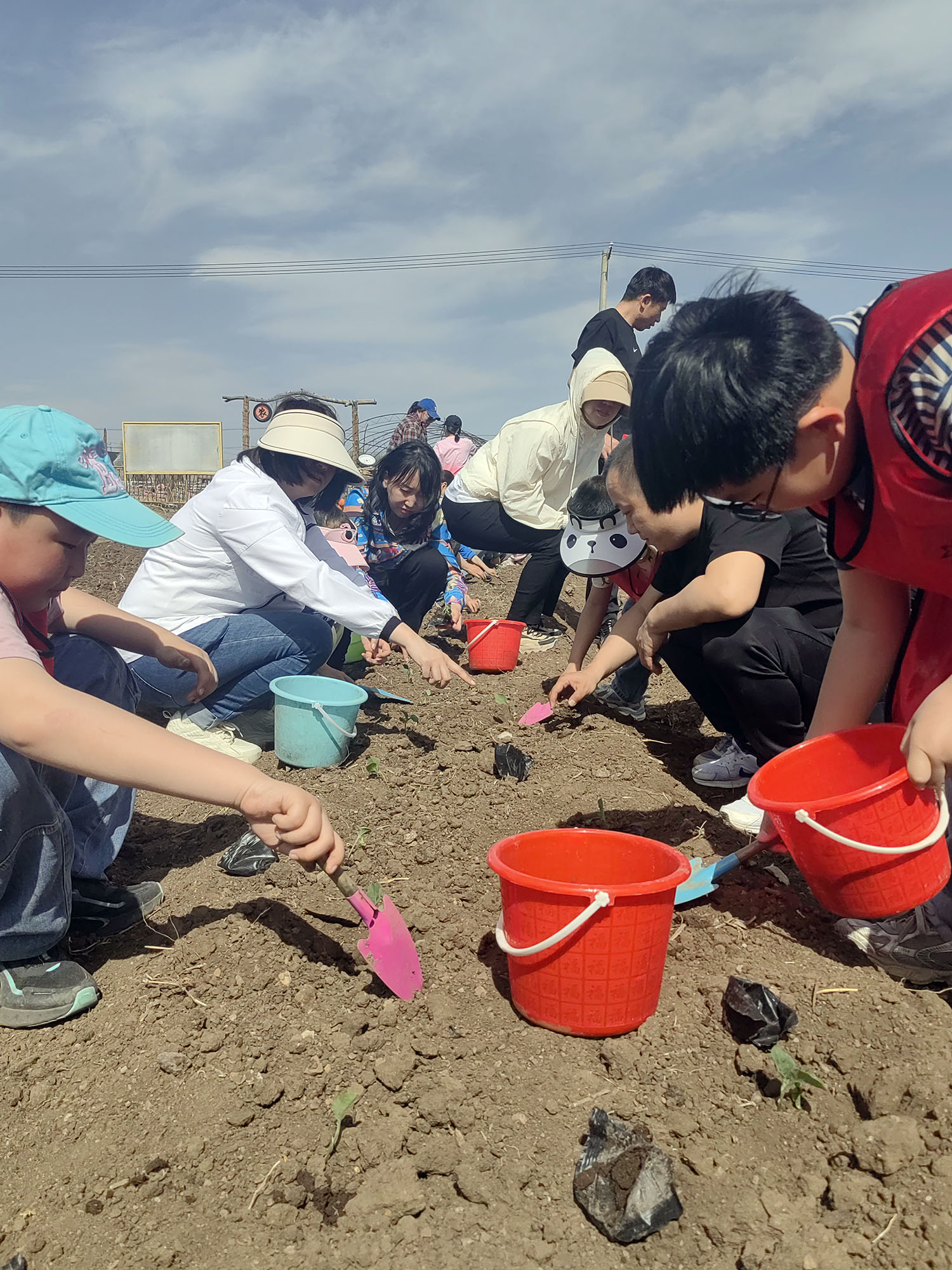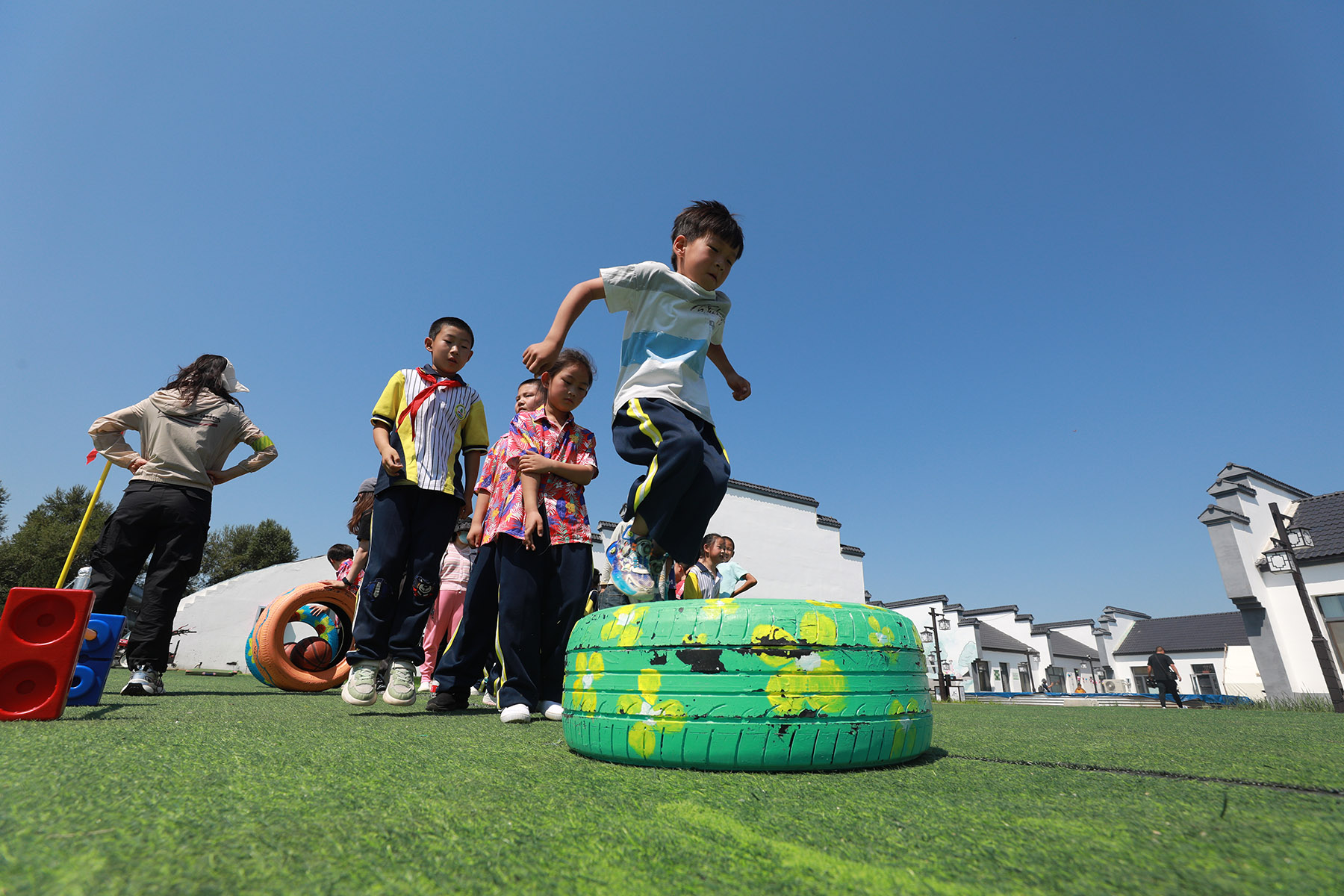Rural area benefits from graduate's return and her business acumen, Yang Feiyue reports.

With short, neat hair and tan skin, Qi Xiaojing beams with a glow of energy that seems to have her ready to hit the ground sprinting at anytime.
In a simple sport suit, the woman, 40, can't help smiling as she introduces a group of guests to her agricultural tourism complex.
Tomato murals and sculptures embellish the facility that the group visited late last month. The facility covers an area of 49,000 square meters in Ping'an village, Horqin Right Wing Front Banner, Hinggan League, North China's Inner Mongolia autonomous region.
The facility, established in 2022, has been filled with laughter since summer arrived as children from across the country have beaten a path to Qi's happy farmland to spend their vacation.
They are seen running around and playing sports on the grasslands or engaging in craft projects under professional guidance, such as painting pebbles, creating clay sculptures or making from scratch steamed buns of various shapes and sizes.
"There's so much fun and learning in our village, from the pastures to the grasslands, where students can pull cabbage, dig celery, pick corn, and shell sunflower seeds," Qi says.
"This way, they can not only learn from outside the school but also help with farm work," she adds.
READ MORE: Pulling the strings for cultural treats
Qi has been busy these days developing short videos of her renewed summer learning tours and promoting them on the livestream platform Douyin.
"We have introduced a five-day trip and more than 300 students have come," she says, adding that she expects the number to reach 5,000 this year, about 1,600 more than last year.
Her facility has reached an agreement with Chinese tech heavyweight Alibaba Group, which will help send more students from across the nation her way.
Over the years, Qi has carried out more than 200 tours that attracted over 100,000 visitors.

The booming operation has helped many of her fellow villagers to increase their incomes, as they get to work at Qi's operations or start up homestay businesses, or have their farm produce sold to cater to the needs of travelers from afar.
To date, her learning-tour business has provided employment for more than 90 villagers who used to struggle to keep their heads afloat by solely living off the land.
In 2022, four women followed Qi's lead in developing rural homestays, with each household seeing an income increase of more than 20,000 yuan ($2,753) that year.
Seeing the profitability, more households have renovated their homes to join in the cause of developing rural tourism, Qi says.
She says she takes pride in that many villagers around her now seem very motivated about the future.
Her name Xiaojing has even evolved into an epithet for enterprising young people committing themselves to rural vitalization, leading locals to prosperity.
Under her influence, more college students have returned to their rural hometowns in Hinggan League.
Her contribution to improving living conditions in her rural hometown has also won her multiple national awards, including the title of March 8 Red-Banner Holder in 2020 — one of the nation's highest honors for women for their outstanding work.
The Hinggan League initiated a plan in 2022 to cultivate more industry-leading talent like Qi. The plan has trained more than 1,200 talents and helped 38,000 farming and herding households increase their annual income by 4,900 yuan per household by the end of 2023. The cumulative operating income reached 358 million yuan.
Born into a local rural household, Qi is no stranger to poverty.
"My family couldn't even put together the tuition fee when I was admitted to college in 2004," she recalls.
"It was my fellow villagers who helped to scrape up the money," Qi says.
It has since given her a strong desire to give back to her hometown.

After graduating from the Inner Mongolia University of Science and Technology, Qi answered the country's call for college students to work in rural areas, a strategy to cultivate talent for new village development.
From 2009-13, Qi went door-to-door, inquiring about rural household needs or helping out in the farmlands, which had her better understand the villagers and rural conditions.
She was inspired to start up her business after visiting a vegetable greenhouse in Northeast China's Liaoning province.
It amazed her to see the thriving vegetables in the biting winter and how a local woman manages two to three greenhouses that produces 5,000-6,000 yuan worth of vegetables.
"It was great to see farmers make money even during the wintertime," she says.
After learning from experts, she took out a bank loan and rented two greenhouses in Ping'an village to grow strawberries in 2014.
It turned out to be an immediate success and brought her more than 80,000 yuan that year. An increasing number of visitors started to come and pick strawberries.
Qi was encouraged to reach out to a few other college graduates who had served rural areas in the region and they jointly established a cooperative in the business of planting various vegetables and fruits, which has been steadily expanding.
Once the cooperative was on track, Qi began pondering how to carry out her original dream of bringing prosperity to her fellow villagers.
In 2017, she proposed a "chicken-for-egg" cooperation model where a farmer receives at least 20 chicks for free from the cooperative and is expected to return 25 eggs per chick once they are grown.
After that, the chickens belong to them and they can sell all the subsequent eggs back to the cooperative.
Her plan worked as it managed to pique villagers' interest and get them on board. They all returned with the eggs as agreed and the cooperative sold the eggs at a profit, creating a win-win situation.
Encouraged by this success, Qi introduced other models like chicken-for-chicken, pig-for-meat and seedling-for-fruit, all of which have effectively increased the incomes of 80 impoverished households.
Wang Xilin, who fell into poverty due to an illness in his early years, regained hope for the future after opting into Qi's plan.
"She trusted me and gave me 50 chicks for free. I didn't have to pay for feed or vaccines," Wang says.
"After raising them, I returned five chickens and sold the remaining chickens for 120 yuan each, earning 5,400 yuan. I am truly grateful," Wang adds.

Qi says her goal has been continuously scaling up the agriculture-related business in the village and helping local villagers sell their agricultural and livestock products to larger markets at better prices.
To achieve that, Qi has established an e-commerce service station to facilitate the sales of rural produce from more than 100 standardized fruit and vegetable greenhouses jointly run by her and other local villagers.
Zhang Xiuqin no longer has to wake up at unearthly hours and rush to sell vegetables at local markets since she started to work with Qi a few years ago.
"We all trust (Qi) Xiaojing. The online orders she provides have never failed to come through and the payment for our vegetables has always arrived on time," Zhang says.
ALSO READ: Sound of the steppes
One greenhouse can increase her income by more than 5,000 yuan, she adds.
Reflecting on the development over the past decade, Qi deems it an upgrade from version 1.0 to version 4.0.
"Version 1.0 was growing crops in greenhouses to develop agricultural production; version 2.0 involved offering tourists vegetable and fruit picking while developing the catering industry; version 3.0 was an advancement to an integrated model of training, lodging and catering; version 4.0 is the current agricultural tourism complex," she says.
To date, Qi has evolved from something of an entrepreneur to a tutor who helps to train more of her fellow villagers to find the key for rural vitalization.
"I believe in the cause, which means bringing more people together to form a youth alliance and sharing resources," Qi says.
"It might be me leading them forward at the beginning, but now they are my pillar of strength and together, we forge ahead."
Contact the writer at yangfeiyue@chinadaily.com.cn


